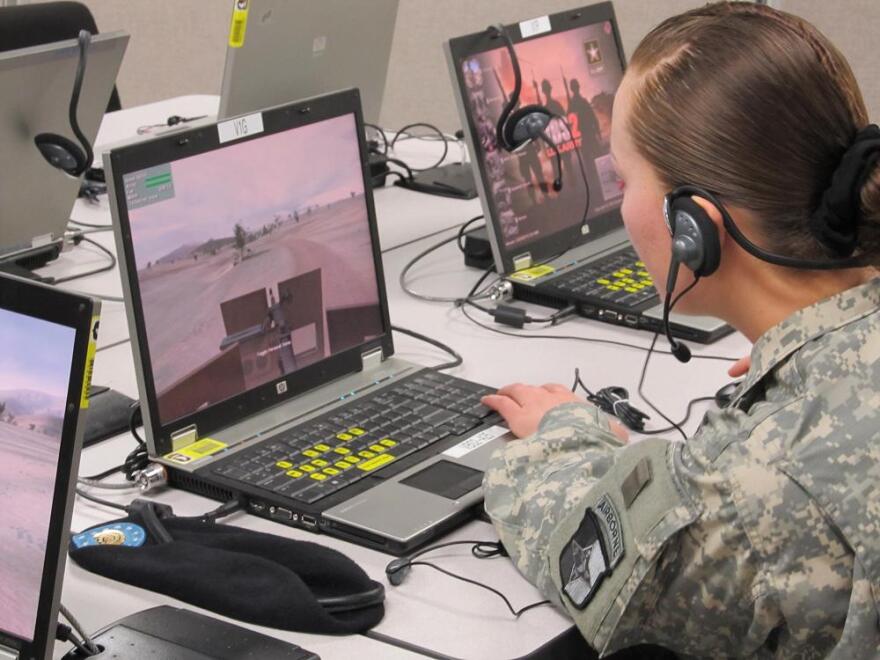By Angela Hatton
http://stream.publicbroadcasting.net/production/mp3/wkms/local-wkms-963515.mp3
Fort Campbell, KY – Thousands of 101st Airborne Division soldiers deploy out of Fort Campbell. Before they ship out, they run drills with some of the military's most advanced vehicles, weapons, and gear, under situations that simulate real war-time experiences. The base's latest training site isn't a field on the Back Forty. It's a non-descript brick building. As Angela Hatton report, inside soldiers use computer simulations based on video games to train for war.
In a plain and windowless classroom, a crew of young soldiers sits a few feet away from each other at laptop computers. They're all logged-in to Virtual Battle Space 2, or VBS2, the military's computer training program. In the game, the group navigates a convoy along a dirt road in a patchy desert landscape, digitally rendered to look like the topography of Afghanistan. They communicate via headsets.
" Vehicle one, this is vehicle two. Continue backing up . . . what was that grid again, over?' I've heard it's niner, five, three, three, five, eight, five, over.'"
Army officials say the VBS2 can simulate a wide-range of environments, including small unit tactics, response to insurgent attacks, and medic procedures. 2nd Lieutenant Chris Armbruster started familiarizing himself with the system in the morning. In the afternoon, his group's already completed an extensive mission.
"Practicing our ability to conduct a convoy operation to a key leader engagement, pulling perimeter security. We had a platoon leader go in, with an intelligence specialist and actually speak with a simulation of a, a local physician in the village."
The training center at Fort Campbell has room for 100 soldiers to log-in at the same time. The new building and its equipment cost less than 750,000 dollars. Virtual Team Chief Adam Williams says that's minimal input compared to the alternative training methods.
"We only have so much space for training out in the field. And training's expensive with fuel costs, ammo what virtual training does is allow units to come in here at no cost to them other than equipment and train on tasks that might be too dangerous or too expensive to do out in the field."
The question is whether virtual training is as effective as field training. Dr. John Pani says it depends on what you're trying to teach. Pani is Associate Professor of Psychological and Brain Sciences at the University of Louisville.
"To the extent you're going to be using communication systems, radios, uh, sensor systems like radar. To the extent you're going to be using vehicle controls, looking at maps, these are all sort of technological interfaces that it's not so hard to simulate."
Pani says situations with any real danger are harder to recreate in gaming.
"Y'know any particular training environment is going to leave something out. But generally they'll train in multiple environments, so in combination, they get as close to the ultimate situation as they can."
Virtual Team Chief Williams says VBS2's intent was never to replace field training.
"The intent was to take a very crawl-walk phase of training, so that you can start building muscle-memory start things. For instance, if you wanted to learn to do a nine-line medivac you could do that by doing that in a virtual environment here, so you're still getting the repetitiveness. You're not going to get the same feeling as if you're out there in the ground, in combat. We can't replicate that as of yet, but the actual skills and the tactical pieces, you can train that here."
In the best case scenario, troops who game first will handle field training with fewer mistakes than those who don't. The problem may be stigma. The term "video game" conjures teenagers with hand-held controllers talking smack in their parents' basement. 2nd Lieutenant Armbruster says while the game may be fun, soldiers aren't there to play around.
"The idea is we don't want our soldiers to just run in, charge in, and get shot down. They should treat this as though they were actually going into combat."
Murray State University Computer Science assistant professor Robert Pilgrim says the army isn't the only organization using games. Engineering students use virtual worlds to test whether a bridge design is stable; scientists build virtual cells and genes to study mutations. Pilgrim says the military's goal of practicing procedure and visualizing scenarios is a practical use that could be explored more in the civilian world.
"I could see if we had more technology available for firefighters, so that on the way to a fire, they could walk through a building before they got there. Know where the hot spots are, know where the hallways are and that sort of thing, it might be, I would guess it would have a positive effect on the ability to save lives."
The army won't be abandoning real-world training anytime soon, but they plan to integrate VBS2 more. Soldiers are redeploying from Afghanistan this spring and summer. Army officials say many of them haven't used VBS2, but they soon will.

